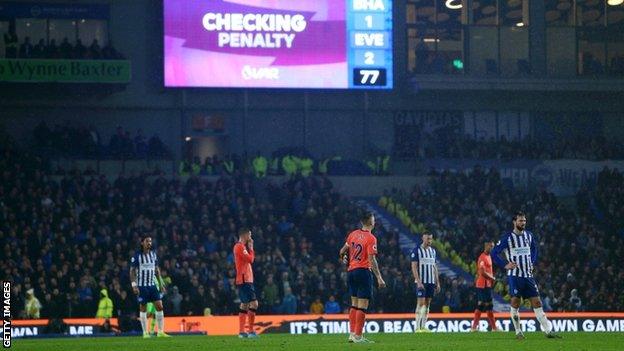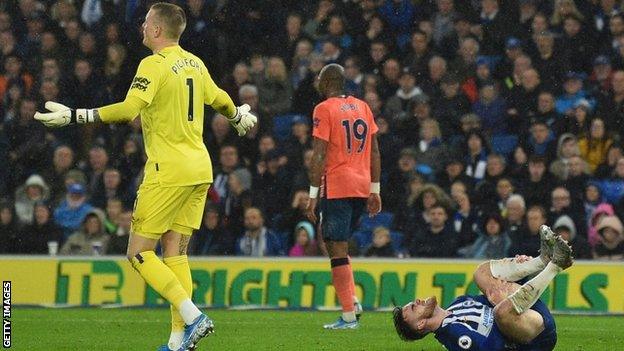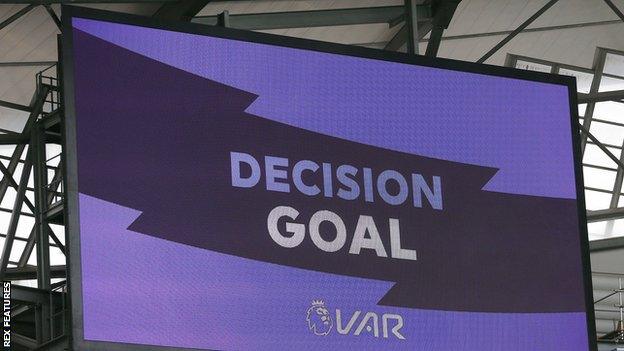VAR: More disagreement on VAR use in Premier League on Saturday
- Published
- comments
Silva angered by VAR inconsistencies
All anyone can agree on about VAR is that we can't agree on VAR.
Video assistant referees were introduced to the Premier League this season to help make difficult decisions easier and eradicate "clear and obvious errors", yet it continues to cause more and more controversy.
On Saturday, during Brighton's win over Everton, VAR intervened to award a penalty for the first time in the Premier League.
But people still can't agree on whether the decision was right or whether VAR should have overruled the referee in the first place.
Toffees boss Marco Silva said the system is "difficult to understand" and earlier in the day VAR and the Premier League's goal accreditation panel couldn't see eye to eye.
Will we ever agree on VAR?
Disagreeing on decisions...

Brighton's penalty on Saturday, scored by Neal Maupay, was the first time a referee's decision has been overturned to award a penalty this season
"Any professional footballer will tell you that's not a penalty."
That was how former Premier League manager Alan Pardew described the decision to award Brighton a spot-kick at the Amex, after Aaron Connolly had been fouled in the box by Michael Keane.
Keane was adjudged to have stepped on the Seagulls striker's foot and, after play had initially continued, VAR brought play back for the foul to give the spot-kick.
"It really is heartbreaking for the game, that decision," the former West Ham and Newcastle manager added. "That is not a penalty.
"The contact is minimal. Minimal. Marco Silva is absolutely distraught about that decision and quite right too."

Everton were leading 2-1 when the penalty was awarded but went on to lose 3-2
BBC Radio 5 Live senior football correspondent Ian Dennis, who was also commentating on the game, agreed with Pardew.
"Never in a month of Sundays is that a penalty," he said.
"People will say yes there is contact but just because there's contact it doesn't mean it's a penalty. That isn't a clear and obvious error. It's a joke!"
All professional footballers will think it is not a penalty, according to Pardew.
Well, actually, they wouldn't...
Former Premier League striker Chris Sutton said: "It would have been a foul outside the box so it was a foul inside.
"That means it has to be a penalty."
And ex-England midfielder Karen Carney said on Final Score: "He's made contact with the same foot he was going to bring the ball down with.
"That's why I thought he was going to give the penalty and VAR eventually did."
VAR may now be part of the English game but that doesn't mean we agree on its decisions...
Disagreeing on when it should be used...
It seems we can't even agree on when VAR should be used either.
Over the first nine weeks of the season, VAR was criticised for not intervening enough, external, for allowing the referee's decision to stand when it seemed like an attacker had been fouled in the penalty area - notably with Jan Vertonghen's tackle on Gerard Deulofeu during Tottenham's draw with Watford last Saturday.
And last week, Burnley manager Sean Dyche said: "The only question mark left for it in my opinion is the turnover of penalties.
"I think we all agree there's been a few that should have been turned over. They should be turned over if they genuinely think they're wrong."
Now, a week later, VAR has been criticised for intervening when there was little contact.
Can it win?
Everton manager Silva said the decisions on Saturday left his side confused, and questioned why Everton were not also given a penalty when forward Richarlison went down in the box in the second half.
"If VAR saw something in our box, why didn't it see 15 minutes earlier the penalty for Richarlison?" Silva said.
"Because of that my players are in the dressing room and don't understand.
"If they see one for one side then they have to see for the other side too. It was a clear penalty. VAR has to be the same for both sides."
Disagreeing with the Premier League...
Perhaps the most bizarre incident on Saturday came when VAR seemed to disagree with the Premier League's goal accreditation panel during Manchester City's win over Aston Villa.
After a check for offside, City's second goal was awarded to Kevin de Bruyne because VAR said there was no clear replays that showed team-mate David Silva had touched the Belgian's cross en route to it hitting the back of the net.
VAR had said that if Silva had been shown to have touched the ball then it would have been ruled out for an offside against Raheem Sterling.

Man City beat Aston Villa 3-0 at Etihad Stadium
However, after full-time, the goal accreditation panel, a body independent of VAR, announced the goal had in fact been awarded to Silva, seemingly a contradiction of the decision made by VAR.
That call was made because the goal panel does not work to the same "clear and obvious" guideline as VAR - but further added to the confusion around the system.
Fans, pundits and managers don't seem to be able to agree on how VAR is used - maybe some issues in football will always remain a matter of opinion.